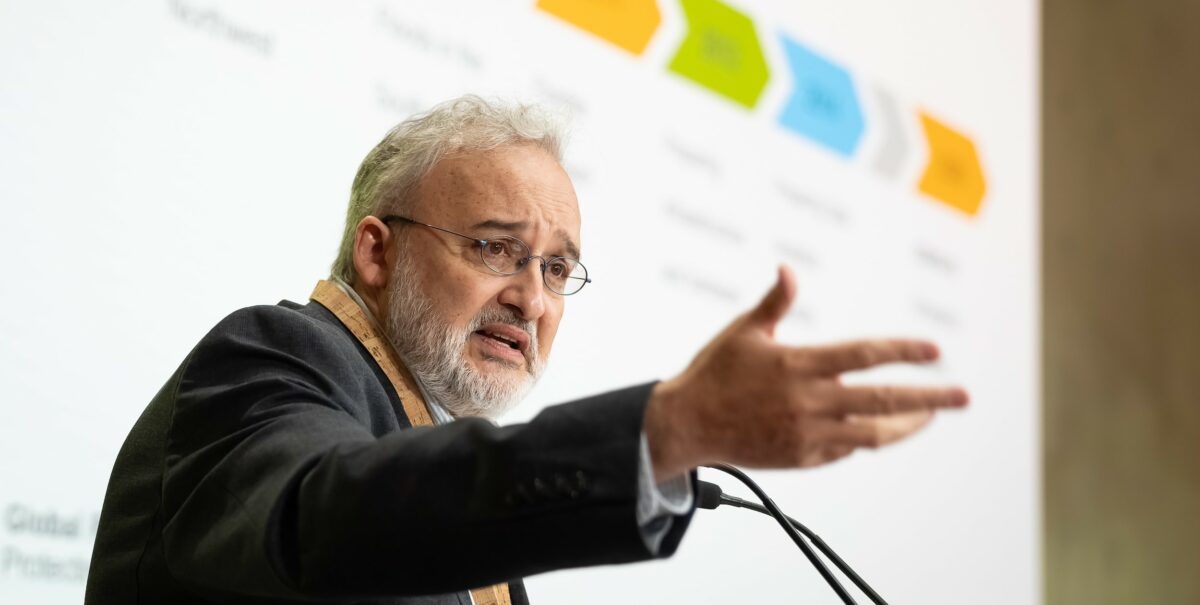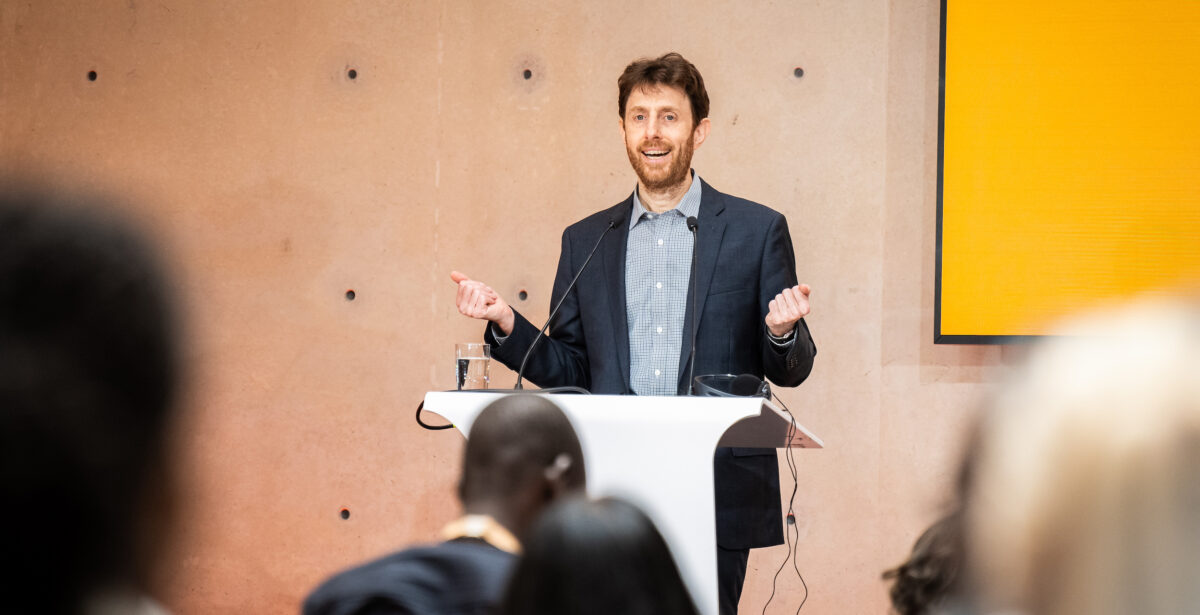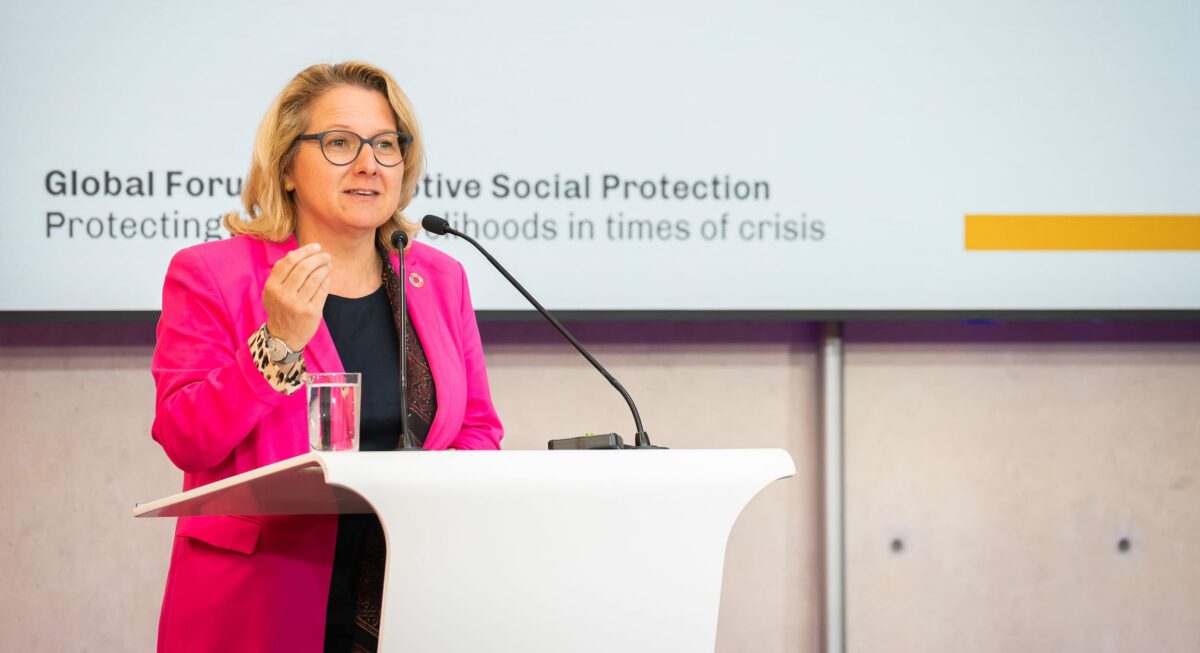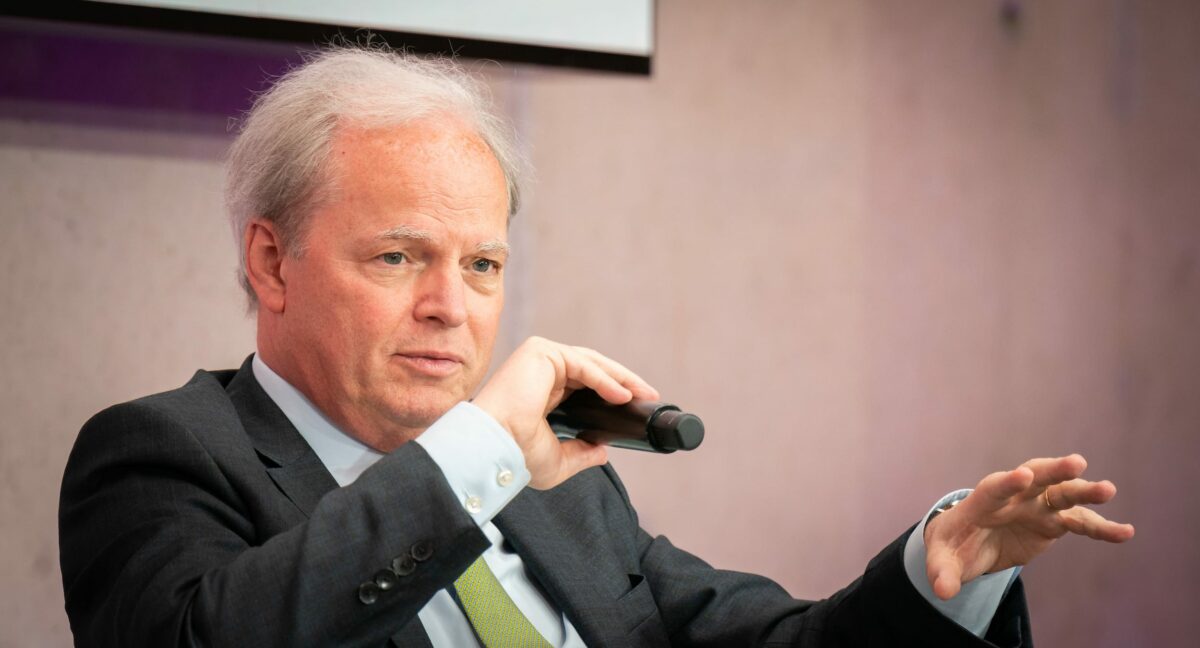Global Forum on Adaptive Social Protection
Protecting lives and livelihoods in times of crisis
June 13-15, 2023
Nearly four billion people worldwide still have no access to social protection. At the first major meeting about social protection since the COVID-19 pandemic, policymakers and practitioners from 59 countries, along with their international partners, called for accelerated efforts to develop, strengthen and expand adaptive systems to protect people in times of crisis and build resilience against future shocks.
A pivotal gathering during a time of polycrisis
Convened against the backdrop of multiple, overlapping global crises, the Global Forum on Adaptive Social Protection brought together more than 300 high-level government officials, social protection practitioners, international partners, and representatives from civil society and academia to strengthen alliances and mechanisms for cooperation in the pursuit of adaptive social protection systems.
The Forum, which was held in Berlin from June 13-15, 2023, was co-organised by Germany’s Federal Ministry for Economic Cooperation and Development (BMZ) and the World Bank. More than 1600 people joined the proceedings online – a testament to the enormous interest in adaptive social protection as an essential contributor to social and economic stability in crisis-ridden times.
This article presents selected highlights from the Global Forum’s opening and closing sessions and four thematic plenaries. More detailed coverage of individual sessions, including links to presentations, can be found below. This video gives an overview of the conference highlights.
Plenary session 1: Programmes
- Parallel session 1.1: What does it take to operationalise a gender-transformative approach to social protection design and delivery in the face of covariate shocks?
- Parallel session 1.2: At the interface between food security and social protection
- Parallel session 1.3: The realities of scale: Maximising resilience outcomes through economic inclusion
Plenary session 3: Finances
- Parallel session 3.1: Reducing inequality through redistribution and domestic financing of social protection
- Parallel session 3.2: Climate and disaster risk financing and social protection: The increasing role of pre-arranged financing for social protection in the Global Shield and beyond
- Parallel session 3.3: The investment case for social protection: Considering ‘value for money’ and ‘cost benefit’
Plenary session 4: Institutional arrangements and partnerships
- Parallel session 4.1: Lessons learned from the Sahel: Working in partnerships to strengthen the linkages between social protection, humanitarian assistance, DRM and climate change
- Parallel session 4.2: The role of social protection in supporting forcibly displaced populations in times of crisis
- Parallel session 4.3: Adaptive social protection: A key lever for averting, minimising and addressing climate-related loss and damage
Security for people at risk of poverty – and for whole societies during collective crises
Social protection does not just provide security for people who are at risk of poverty across the lifecycle, said Bärbel Kofler, the State Secretary at BMZ, in her welcoming remarks during the opening session of the Forum. ‘Experience shows that adaptive social protection systems make it possible to provide protection during collective crises,’ whether these be pandemics, natural disasters linked to climate change, or the cost-of-living crisis currently being felt around the world.
Countries that are able to increase their social benefits quickly, in line with needs, and to expand them to additional target groups are better able to mitigate the large-scale economic and social impacts of shocks, she noted. This is particularly important for women and girls, who are often hardest hit by crises. ‘Social protection systems give women and girls access to resources, thus making them more independent,’ she said. ‘This benefits entire societies.’
Adaptive social protection and climate action go hand in hand

Increasingly, the shocks societies face are linked to climate change, whether in the form of droughts, floods or other extreme weather events. ‘It’s very easy to talk about social protection as something distinct from climate change, but in fact adaptive social protection and climate action go together,’ said Mamta Murthi, the Vice President for Human Development at the World Bank, in her opening remarks.
Not only can adaptive social protection help respond to shocks, but it is essential for supporting people to move into less carbon intensive work. ‘We can’t really talk about decarbonisation without talking about social protection,’ said Mamta Murthi.
Time to change the default and set up ‘the plumbing’
In his keynote address Stefan Dercon, Professor of Economic Policy at the Blavatnik School of Government at the University of Oxford, challenged those present to ‘change the default.’ ‘I think we risk wasting the opportunities we have and need to be willing to think a bit more carefully about what it is we’re actually trying to do,’ he said.

While noting that there is ‘much to applaud’ – from the ample evidence of the effectiveness of cash transfer schemes to the tremendous scale-up of programmes during the COVID-19 pandemic – Stefan Dercon also conceded that the implementation of social protection remains poor. Less than 10 percent of the population in low-income countries was covered during the pandemic, because in some places the systems were simply not in place, despite decades of talk about the need for them. The failure, he believes, has been in devoting insufficient attention to the ‘plumbing’ that is needed to ensure that social protection can function properly during timesof crisis.
For this, in his view, three things are needed: first, local political ownership across the whole of government, but also among other key institutions including the business community, academia and even the military; second, a true digital system based on a government-to-person (G2P) digital infrastructure and not a ‘digitised analogue social protection system’; and third, a system which is sustainable because it is designed with financing – whether tax-based or pre-arranged – in mind.
Keep investing in foundational social protection systems
The first of the four plenary sessions – each of them devoted to one of the four ‘building blocks’ of adaptive social protection – focused on moving beyond programmes. It took stock of recent trends in social protectionprogramming and considered what needs to be done to scale-up, improve coverage and ensure that programmes are inclusive, gender-transformative and well-integrated.

Michal Rutkowski, Global Director for Social Protection and Jobs at the World Bank, set the scene, describing how social protection has emerged in the context of the COVID-19 pandemic and the current inflation crisis as a ‘frontline response’ for mitigating shocks and building resilience. ‘Even before these current crises we saw a growing trend when it comes to the number and severity of disasters,’ he said. ‘Everything that has come since only underlines the need for social protection systems to be able to react quickly to both extreme and slow-onset events.’
This means investing in foundational social protection systems in times of relative calm, as these are essential for defining who needs benefits, when, and where, when a shock hits. Delivery systems must be inclusive by design and explicitly address gender gaps and other existing inequalities. There are opportunities all along the service delivery chain to address existing gender inequalities and these must be seized, said Michal Rutkowski.
In a panel discussion which followed – moderated by Natalia Winder Rossi, Director, Social Policy and Social Protection, Programme Group UNICEF – representatives from the governments of Egypt and Niger, as well as the United Kingdom’s Foreign, Commonwealth and Development Office (FCDO) and the European Commission, explored how social protection programmes can build resilience, including in contexts of displacement and conflict, and stressed the importance of collective accountability across government. You can read more about their discussion here.
Answering the data and technology riddle: ‘Decipher me or I will devour you’
Delivering social protection services efficiently, flexibly and at scale is unthinkable without digital technologies. The second plenary session focused on adaptive social protection building block number two – data and information systems – and explored opportunities to harness the innovative potential of ICT.

Rodrigo Assumpção, the CEO of DataPrev, the Social Security Information and Technology Enterprise of Brazil, started the session off with a framing presentation. In it, he gave the ‘Sphinx Riddle’ from Greek mythology a modern twist in order to underscore the imperative for governments and social protection agencies to take control of their IT and data operations.
Just as the Sphinx at the gates of Thebes would devour hapless travellers who could not answer her questions, today’s digital technologies threaten to do the same to those who implement social protection programmes: ‘If you don’t decipher data and ICT, it will devour you with rising costs and budgetary demands that will be completely beyond your capacities,’ said Rodrigo Assumpção. The lack of an integrated digital infrastructure not only leads to inefficiencies and ultimately to wasted public expenditure, it also undermines the ability of governments to deliver social protection services, he explained. Data is the infrastructure which societies need to function in the 21st century.
The answer to the riddle? Efficient data governance and management processes. ‘The main lesson is that ICT systems have become too important to be left in the hands of IT people,’’ he continued. ’This means that you have to take control of your IT and data operations.’
In a panel discussion which followed – moderated by Tina George, Senior Social Protection Specialist at the World Bank – representatives from the governments of Pakistan and Togo, and from the Deutsche Gesellschaft für Internationale Zusammenarbeit (GIZ) – explored different dimensions of what it means to ‘take control,’ from the use of novel data sources to the creation interoperable digital systems and bridging the digital divide. Their discussion is covered in more detail here.
Where can, and should, sustainable financing for social protection come from?
The third plenary session considered adaptive social protection building block three: financing. The International Labour Organization (ILO) estimates that more than US$1.2 trillion will be needed by 2030 to achieve universal access to social protection. This does not factor in any type of disaster risk funding that adaptive social protection calls for. Where can, and should, this financing come from?

David Stewart, Chief of the Child Poverty and Social Protection Unit at UNICEF, sketched out the difficult context in which we find ourselves. Although states are the key actor for social protection financing, treasuries worldwide are under pressure. Many of the world’s poorest countries, where the financing gap is greatest, are in the midst of a debt crisis.
Increasing tax revenue, reallocating public expenditure and expanding official development assistance (ODA) are three avenues which should be considered. While it is far from easy to expand the tax base, David Stewart conceded, ‘we are reaching a point where we have to think differently.’ Pointing out that the projected size of the global market for mega yachts ten years from now would be enough to fully cover social protection gaps for children under five in the world’s poorest countries, he observed that ‘there are some things that will have to change if we are going to go through a Just Transition.’
The removal of fuel subsidies is another politically difficult but potentially game-changing shift that could unlock massive resources for reallocation into social protection programming, which remains significantly underfunded compared to education and health. Similarly, if overall ODA was at the 0.7% target (instead of the current 0.33%), and the share allocated to social protection was comparable to education (i.e. 5.5%, rather than the current 2%), more than US$25 billion in financing for social protection could be made available.
The panel discussion which followed was moderated by Alexandre Kolev, Head of the Social Cohesion Unit at the OECD Development Centre. In it, representatives of the governments of Indonesia and Zambia, as well as the Inter-American Development Bank and the International Monetary Fund (IMF), agreed with David Stewart that the investment case for social protection is already strong, but that the case for adaptive social protection needs to become stronger.
In a message surely picked up by Ministers of Finance everywhere, Delphine Prady, a Senior Economist at the Fiscal Affairs Department of the IMF, confirmed the importance of spending on social protection, health and education as the key sectors for inclusive development. Social protection can be ‘macro-critical,’ in IMF parlance, in terms of fiscal sustainability, spending adequacy and spending efficiency, she noted.
The panel discussion is covered in greater detail here.
It can be difficult to change the way we work. We must do it anyway.
Dirk Meyer, Director General, Global Health Employment, Transformation of the Economy, Digital Technologies, Food & Nutrition Security at BMZ, kicked off the final plenary session, which focused on adaptive social protection building block number four: institutional arrangements and partnerships. He did so with a full-throated plea to push through the initial ‘transaction costs’ which often stymie progress towards greater collaboration between organisations. Doing so can bring disparate social protection efforts into greater alignment at a time when this is desperately needed.

Dirk Meyer explained how the COVID-19 pandemic provided both the need and the opportunity to throw out the traditional playbook and to test out new ways of working. For example, through its collaboration with the World Bank, the World Food Programme and UNICEF in the Sahel region, BMZ helped to leverage the contributions of different actors in support of the Government of Niger’s COVID response agenda. In practical terms, this led to better alignment in terms of eligibility criteria, payment mechanisms and monitoring, and facilitated the provision of emergency support through the national social protection system.
This experience has convinced BMZ of the great potential of effective coordination, explained Dirk Meyer: ‘We now understand that the next crisis is waiting around the corner. Adaptive social protection is crucial.’ The challenge is how to develop these systems in coordinated way that combines the strengths of UN organisations, international financial institutions and bilateral development partners.
To this end, BMZ has launched a new joint financing mechanism, under the Global Accelerator on Jobs and Social Protection for Just Transitions, to facilitate and incentivize closer partnership between the World Bank and other international financing institutions and the International Labour Organization and other UN agencies.
In the panel discussion which followed – moderated by Mattias Lundberg, Program Manager RSR-ADSP and Partnership Advisor at the World Bank – representatives of the governments of Cambodia and Senegal, as well as the ILO and the World Food Programme, looked in more detail at what it takes to implement partnerships in practice within countries and at the regional and international level. Factors such as government leadership, strong policy frameworks, and effective inter-ministerial steering mechanisms were highlighted. The panel discussion is covered in greater detail here.
Momentum is building – and more actors are on board than ever before
At the end of three intensive days, the Global Forum on Adaptation Social Protection concluded with a look to the future – and with concrete commitments to advance the social protection agenda.

‘Given the global crises and the enormous social challenges that we are seeing, expectations for social protection systems are really high,’ said Svenja Schulze, Germany’s Minister for Economic Cooperation and Development. ‘At the same time, financial resources are limited and that is why we need to support our partners in their efforts to make their systems more efficient and more effective.’
On behalf of BMZ she announced an initial commitment of EUR 7 million to the new joint financing mechanism, and encouraged representatives from other institutions which provide ODA to participate in the new initiative politically and financially.
In a video message, Gilbert Huongbo, the Director-General of the ILO, underscored the importance of this new initiative for bringing the strategies of the United Nations, international financial institutions and other development partners into closer alignment. ‘Momentum is building behind the cause of universal social protection,’ he said. ‘By working together we can accelerate progress towards social justice and give millions of people the chance for a better future.’

In his closing remarks Axel van Trotsenburg, Senior Managing Director at the World Bank, reiterated that advancing the social protection agenda needs ‘partnerships in dialogue and partnerships in action.’ The message which everyone should take away from the Forum is that the situation is serious: ‘We are not going in the right direction and we need to act,’ he said.
The issues we are confronting are too big and complex to tackle alone, Axel van Trotsenburg said. Partnerships are the way forward and their exact nature is less important than the fact that they be ‘driven by good ideas.’ He urged those present to leave the Forum as ‘champions for change and urgency.’
The call to action which reverberated throughout the Global Forum on Adaptive Social Protection was notable not only for its urgency, but also for its breadth. A corner has been turned; discussions about social protection are no longer limited to ‘the converted.’ Experts working on climate change, food security, digital technologies and financing instruments are now central to the conversation. Recent crises have brought ever more actors together – it is now up to all of us to turn this ‘silver lining’ into something meaningful and durable.
June 2023






































